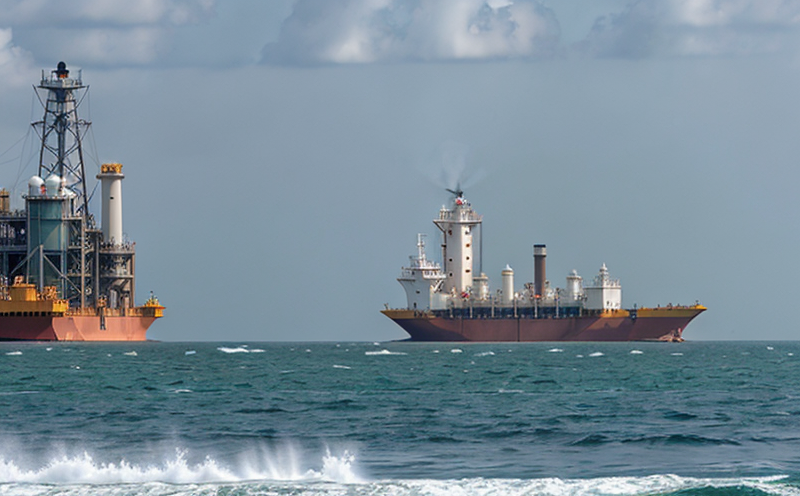Determining the corrosion rates of chemicals used in aggressive environments like offshore drilling and chemical processing
The Crucial Role of Determining Corrosion Rates in Aggressive Environments A Lifeline for Offshore Drilling and Chemical Processing Industries
In the unforgiving environments of offshore drilling and chemical processing, the integrity of equipment and pipelines is constantly threatened by the corrosive effects of chemicals, seawater, and other substances. The consequences of corrosion can be catastrophic, resulting in downtime, costly repairs, and even environmental disasters. In such scenarios, determining the corrosion rates of chemicals used in these environments assumes paramount importance. Eurolab, a leading provider of laboratory services, offers this critical service to help businesses safeguard their investments and ensure operational continuity.
The Importance of Corrosion Rate Determination
Corrosion is a chemical reaction between a material (usually metal) and its environment that causes deterioration. In aggressive environments like offshore drilling and chemical processing, corrosion can occur rapidly, compromising the structural integrity of equipment and pipelines. The rate at which corrosion occurs (corrosion rate) determines the extent of damage and the time required for repair or replacement.
Determining the corrosion rates of chemicals used in these environments is essential for several reasons
Prevents Equipment Failure By understanding the corrosion rate, businesses can take proactive measures to prevent equipment failure, ensuring operational continuity and minimizing downtime.
Reduces Maintenance Costs Identifying high-risk areas allows companies to focus maintenance efforts on those specific areas, reducing overall maintenance costs.
Ensures Regulatory Compliance Corrosion rate determination helps industries comply with regulatory requirements, avoiding costly fines and reputational damage.
Enhances Safety By mitigating corrosion risks, businesses can ensure a safer working environment for personnel, reducing the likelihood of accidents and environmental disasters.
The Benefits of Using Eurolabs Corrosion Rate Determination Service
Eurolabs laboratory services provide businesses with accurate and reliable results to inform their decision-making processes. The benefits of using our service include
Accurate Results Our state-of-the-art equipment and expert technicians ensure precise measurements, providing a clear understanding of corrosion rates.
Comprehensive Analysis We offer detailed analysis reports, identifying areas of high risk and recommending mitigation strategies.
Timely Turnaround Eurolabs service is designed to meet tight deadlines, ensuring that businesses receive critical information when they need it most.
Cost-Effective Solutions By providing actionable insights, our service helps industries develop cost-effective solutions to mitigate corrosion risks.
Key Benefits of Corrosion Rate Determination
Prevents catastrophic equipment failure
Reduces maintenance and repair costs
Ensures regulatory compliance
Enhances safety for personnel and the environment
Provides accurate and reliable results
Offers comprehensive analysis and recommendations
Meets tight deadlines
Delivers cost-effective solutions
QA Frequently Asked Questions About Corrosion Rate Determination
What is corrosion rate determination?
Corrosion rate determination is the process of measuring the rate at which a material (usually metal) deteriorates due to chemical reactions with its environment.
Why is corrosion rate determination essential for offshore drilling and chemical processing industries?
Its essential for preventing equipment failure, reducing maintenance costs, ensuring regulatory compliance, and enhancing safety in these environments.
How can Eurolab help my business determine corrosion rates?
Our laboratory services provide accurate and reliable results to inform your decision-making processes, helping you develop cost-effective solutions to mitigate corrosion risks.
What types of equipment and materials do you test for corrosion?
We test a wide range of equipment and materials used in offshore drilling and chemical processing industries, including pipelines, pumps, valves, and other metal components.
How long does it take to receive results from Eurolabs service?
Our service is designed to meet tight deadlines, ensuring that businesses receive critical information when they need it most.
Conclusion
Determining the corrosion rates of chemicals used in aggressive environments like offshore drilling and chemical processing is a critical process that requires expertise and specialized equipment. By choosing Eurolab for this laboratory service, businesses can rest assured that their investments are safeguarded, and operational continuity is ensured. Dont risk your reputation, finances, or personnel safety contact us today to learn more about our corrosion rate determination services.
-
Testing chemicals for their ability to cause damage to metals, plastics, and other materials
-
Simulating exposure to corrosive chemicals to evaluate their impact on materials used in industrial applications
-
Determining the level of corrosion that a chemical can cause on different surfaces over time
-
Evaluating the effect of temperature, humidity, and pressure on the corrosivity of chemicals
-
Testing the corrosivity of chemicals used in cleaning agents, solvents, and industrial processes
-
Ensuring that chemicals used in manufacturing do not lead to the degradation of equipment or infrastructure
-
Testing for the presence of corrosive substances that could pose a threat to workers and the environment
-
Simulating long-term exposure to determine the corrosive effects of chemicals during storage and transportation
-
Evaluating the resistance of coatings and protective materials against corrosion caused by chemicals
-
Testing the effects of chemical spills and leaks on the corrosion of pipelines, tanks, and machinery
-
Assessing the corrosivity of chemicals under extreme environmental conditions such as high temperatures and pressures
-
Testing the interaction between chemicals and metallic components used in construction or automotive applications
-
Ensuring that materials exposed to chemicals are resistant to corrosion in critical industrial settings
-
Verifying that chemical products comply with industry regulations regarding corrosivity and material safety
-
Testing the effectiveness of corrosion inhibitors in preventing chemical damage to metal surfaces
-
Evaluating the impact of exposure to moisture, salt, and other environmental factors on the corrosive properties of chemicals
-
Simulating exposure to chemicals in real-world environments to assess their potential to cause corrosion over time
-
Testing the pH levels of chemicals and their relationship to the corrosivity of substances on surfaces
-
Assessing the long-term impact of chemicals on the integrity of storage containers, pipes, and tanks
-
Testing the effect of chemical interactions on corrosion rates when chemicals are mixed with other substances
-
Ensuring that chemicals used in coatings and paints do not cause corrosion over time in various environmental conditions




